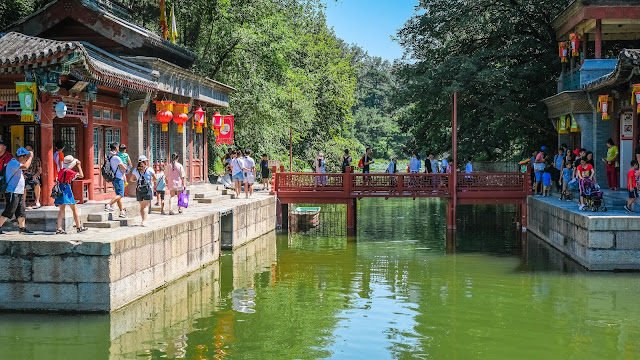Chinese Summers
By Anita Pan
In the hot, muggy days of July and August, China takes it upon herself to be as unpleasant as possible. Furious streams of light burst forth and tear curtains apart in forty-something-degree weather, ruthlessly biting and roasting human flesh until someone turns on the AC. Even then, the sunlight doesn’t shrink. It simply dilutes. Stands outside the window, waiting to strike. Biding time.
But if you’re lucky—and you manage to evade the sun during the morning and afternoon—you’re still vulnerable in the evening. The sun leaves, and in its place, nature unleashes an army of relentless mosquitos. Leisurely evening walks become horribly perilous when their distant whines get closer.
This means, before stepping an inch outside the door, I must douse myself in an acidic Chinese mosquito repellent. The traditional kind comes from a thick green bottle, embossed with a flimsy paper label titled “Flower Nectar Water”—a lie of inhumane proportions. It smells nothing like fresh flowers or sweet nectar. One sniff and my eyes get all red and watery.
But I bear it, and everyone else bears it, because Chinese mosquitos are tough. They grow fatter and louder and more insolent each year, putting their American counterparts to shame. From the youngest baby in a stroller to the oldest lady with a tough, wrinkled hide, all it takes is one evening walk for anyone to emerge the next morning covered in raw, pink bumps. (On an unrelated note, Chinese backscratchers sell very well.)
But despite China’s best attempts to be terrible—the mosquitos and sunlight hot enough to barbecue people and all—summer remains undeniably beautiful. The skies take on a deep, brilliant shade of blue and dot themselves with fat, soft chunks of cloud. Large bodies of water—whether it be a local lake or little stream in a park—shimmer gently, bits and pieces of golden light rippling on their shiny surfaces. And as the sun goes down, a damp, sweet scent of dew wafts from the trees, colored in shades of raw sienna and orange. In those moments you take a deep breath and quite literally feel summer in your lungs—forgetting about worries and problems and even the mosquitos. The air turns warm and cool at the same time, swirling and blowing delicately, pinching one’s arms and legs gently in an act of encouragement. The far-away chirps of cicadas complete the scene.
This kind of summer thing probably happens in every country out there. But for China, there’s a sort of freshness which isn’t seen during fall, or winter, or even spring. Summer is when China truly bursts into life, turning hot and yellow and green, carelessly drawing swathes of green grasses and breathes of sweet air for all. But as fall rolls around, that beauty dulls and dampens. The trees lose their scent, the air turns unpleasantly sticky, the waters grow muddy and gray. By winter China is cold and hard again, hiding inside a shell of ugly weather.
But all is not lost. When spring arrives, the country falls into anticipation, giddily awaiting summer. Life starts to swelter. Cicadas appear, the sky grows bright, and mosquitos invade. Waters ripple excitedly, while trees waft gently from side to side. The price of AC systems inflates. And before I know it, I’m lounging outside again—accompanied with a fan and a flyswatter, licking an orange popsicle—and looking up at the sky.
Anita Pan is a sophomore at York House School in Vancouver, BC. Her work has been published in The Greyhound Journal, The Weight Journal, and The Milking Cat. She also runs a literary magazine of her own—called The Pinnacle, which is currently accepting submissions! When she’s not coming up with terrible short story ideas, she’s probably breathing. Or blinking. Maybe both.



Comments